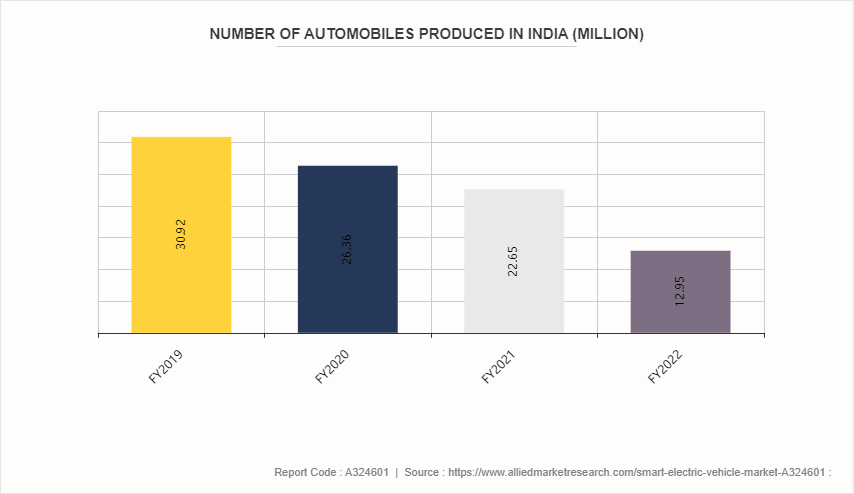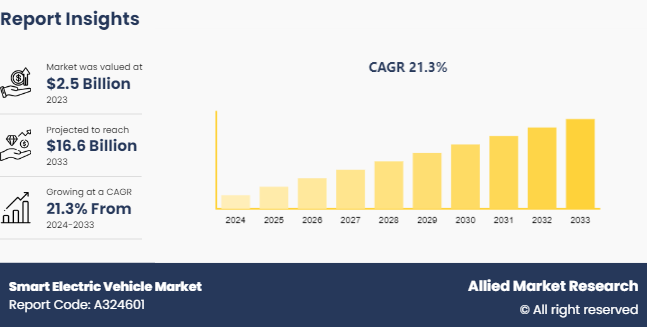Smart Electric Vehicle Market Research, 2033
The global smart electric vehicle market size was valued at $2.5 billion in 2023, and is projected to reach $16.6 billion by 2033, growing at a CAGR of 21.3% from 2024 to 2033.
Market Introduction and Definition
Smart electric vehicles are going to influence the automobile industry in the coming years. The rising amount of air pollution has sparked worry among governments around the world. The transportation industry is a key contributor to this cause, and numerous measures are being taken to protect the environment, including increasing the use of electric vehicles.
Technological advancement will be an important factor in the growth of the smart electric vehicle market. Rising fossil fuel prices, such as petrol and diesel, will provide an additional advantage to the market. When compared to other fuel choices on the market, electric vehicles are more efficient and have lower running expenses. Another important factor is the environmental risks associated with the use of conventional fuels; several countries are developing creative methods and technologies to mitigate the damage caused by reducing vehicle emissions.
The growing adoption of electric vehicles as owing to the rigorous discharge rules, along with government pressure to embrace electric vehicles through incentives and subsidies on electric vehicle sales, is expected to boost demand for smart electric vehicles. Increased electric car sales, rapid automotive electrification, government actions to promote electric vehicle production, and tax and subsidy benefits are likely to boost smart electric vehicle industry.
Key Takeaways
The smart electric vehicle market study covers 20 countries. The research includes a segment analysis of each country in terms of value ($Million) for the projected period 2023-2032.
More than 1,500 product literatures, industry releases, annual reports, and other such documents of major smart electric vehicle market industry participants along with authentic industry journals, trade associations releases, and government websites have been reviewed for generating high-value smart electric vehicle industry insights.
The study integrated high-quality data, professional opinions and analysis, and critical independent perspectives. The research approach is intended to provide a balanced view of global markets and to assist stakeholders in making educated decisions in order to achieve their most ambitious growth objectives.
Recent Key Developments
In April 2024, in India, Jamshedpur, Morris Garages launched a smart ZS EV and MG Comet EV drive. The aim behind this launch was to spread awareness about electric vehicles as a cost-effective, eco-friendly, and viable transportation solution for urban areas. The Morris Garages is a renowned British automobile company.
In April 2024, in India, Jamshedpur, Morris Garages launched a smart ZS EV and MG Comet EV drive. The aim behind this launch was to spread awareness about electric vehicles as a cost-effective, eco-friendly, and viable transportation solution for urban areas. The Morris Garages is a renowned British automobile company.
In December 2023, to explore and drive vehicle-to-home energy management and support optimal home energy management, Resideo and Ford Technologies launched a joint stimulation project. The project explored, quantified, and tested the consumer advantages of pairing bi-directional electric vehicle charging with a Resideo smart to help consumers reduce strain on the U.S. electric grid, enable the use of clean energy, and save money on monthly electric bills.
Key Market Dynamics
Electric vehicles produce no exhaust emissions and are a significant factor in lowering air pollution in urban areas. As cities move towards sustainability, these electric cars provide a sustainable alternative that is in line with international efforts to combat climate change. Furthermore, even though electric cars require a larger initial investment, smart electric drives typically have lower overall ownership costs.
Long-term financial benefits for owners of electric vehicles are largely due to factors like lower maintenance costs, government incentives, and the cheaper cost of energy compared to petrol. These vehicles utilize electric propulsion, and compact electric cars provide ideal alternatives for short-distance travel, thereby addressing parking concerns and reducing traffic congestion. These are the primary drivers likely to fuel the growth and demand for smart electric drives.
However, limited driving range and infrastructure may hinder market expansion. The absence of suitable charging infrastructure and electric vehicles restricted driving range can hinder the adoption of smart electric vehicle. The desire for infrastructural expansion and range anxiety are significant challenges. As a result, these are the primary issues limiting growth and demand in the smart electric drive market.
Innovations of Global Smart Electric Vehicle Market
The smart electric vehicle market share is experiencing significant advancements driven by technological innovations, changing consumer demands, and supportive regulatory environments. One of the most notable technological advancements is in battery technology. Solid-state batteries are emerging as a superior alternative to traditional lithium-ion batteries, offering higher energy density, faster charging times, longer lifespan, and improved safety. Additionally, ongoing improvements in lithium-ion batteries continue to enhance energy densities, reduce costs, and decrease charging times.
Autonomous driving technology is another major area of innovation. Smart EVs are increasingly equipped with self-driving features, including adaptive cruise control, lane-keeping assistance, and even full self-driving capabilities. Advanced driver-assistance systems (ADAS) further enhance safety by incorporating features such as automatic emergency braking, blind-spot detection, and traffic sign recognition. These technologies are making vehicles safer and driving more convenient.
Connectivity is also playing a crucial role in the evolution of smart EVs. Vehicle-to-Everything (V2X) communication enables vehicles to interact with each other, infrastructure, and other road users, which improves safety and optimizes traffic flow. The integration of the Internet of Things (IoT) in vehicles allows for remote diagnostics, over-the-air updates, and enhanced infotainment options, making the driving experience more seamless and connected.
Charging infrastructure is evolving to support the growing adoption of EVs. The development of ultra-fast charging stations can significantly reduce charging times, making electric vehicles more practical for long-distance travel. Wireless charging technology is also being introduced, allowing EVs to charge without the need for physical connectors, which enhances user convenience.
Energy management systems are becoming smarter with the integration of smart grids. These grids enable better management of electricity supply and demand, optimizing the use of renewable energy sources and reducing the overall environmental impact of EVs. This integration supports the broader adoption of electric vehicles by ensuring that the energy they use is both sustainable and efficiently managed.

Market Segmentation
The smart electric vehicle market is segmented into vehicle type, application, drive and region. On the basis of vehicle type, the market is divided into passenger cars and commercial vehicles. On the basis of drive, the market is divided into FWD, RWD and AWD. Region-wise, the market is analyzed across North America, Europe, Asia-Pacific, Latin America, and Middle East and Africa.
Regional/Country Market Outlook
The European smart electric vehicle market size is growing rapidly, owing to a combination of technology innovations, governmental assistance, and shifting consumer preferences. Technological advancements, especially in battery technology and autonomous driving features, are increasing the efficiency, safety, and desirability of electric vehicles. The combination of advanced driver assistance systems (ADAS) and vehicle-to-everything (V2X) connectivity is making EVs smarter and more connected, which improves both user experience and traffic safety.
Regulatory frameworks in Europe strongly encourage the transition to electric mobility. The European Union's severe emission laws and ambitious carbon reduction targets are driving automakers to speed up the development and acceptance of electric vehicles. Governments across the region??are providing large incentives, such as tax reductions, to encourage consumers to purchase electric vehicles.
Competitive Landscape
The major players operating in the smart electric vehicles market include Tesla Inc., Aisin Corp, Borg Warner, Bosch, Hitachi, Continental AG, Hyundai Mobis, Magna, Scaeffler, Sinoev, UQM Technologies, and Shanghai Edrive.
Key Players
The smart electric vehicle market involves several major players such as Nidec Corp, Aisin Corp, and Borg Warner which are notable for their contributions to design, manufacturing, and distribution. The market is influenced by technological advancements such as improvements in battery technology and the development of autonomous driving features, which are driving the market forward. Connectivity enhancements, including Vehicle-to-Everything (V2X) communication and Internet of Things (IoT) integration, are making EVs more efficient and user-friendly.
Economic factors, such as the cost of raw materials and fluctuating fuel prices, affect production costs and consumer demand. Regulatory policies and government incentives, such as subsidies and emission regulations, are crucial in promoting the adoption of EVs
Industry Trends:
In December 2023, Hyundai's partnership with Amazon to sell new vehicles online has created uncertainty in the automotive retail sector, as dealers await further details to understand the impact on their businesses and the potential competition from the world's largest e-commerce platform.
In August 2023, Schaeffler India, a subsidiary of the global automotive and industrial supplier Schaeffler AG, is set to fully acquire Koovers, an Indian online platform specializing in auto spare parts. This strategic acquisition aims to bolster Schaeffler India's digital footprint in the aftermarket sector, enhancing its service capabilities and customer reach. By integrating Koovers' innovative digital solutions and robust distribution network, Schaeffler India plans to streamline its supply chain, offer a wider range of products, and provide more efficient services to its customers.
In 2022, The Ministry of Industry and Information Technology (MIIT) , China, published a "Catalog of New Energy Models Exempt from Vehicle Purchase Tax" on its official website. The plug-in hybrid models chosen include 14 passenger vehicles (such as Chery's Dasheng and Great Wall Motor's Mocha PHEV) , three buses, four trucks, and eight specialty vehicles.
In January 2024, 2.32 million passenger vehicles, 3W, 2W, and quadricycles had been produced. Between April and January of FY24, 23.36 million passenger cars, commercial vehicles, two-wheelers, three-wheelers, and quadricycles were produced in India.
In 2020, the International Organization of Motor Vehicle Manufacturers estimated that 70.50 million passenger cars would be produced worldwide (OICA) .
Key Sources Referred
India Brand Equity Foundation
National Ocean Industries Association
Occupational Safety and Health Administration
ANSI Organisation
U.S. Department of Transportation
National Aeronautics and Space Administration
International Transport Forum
Maryland Department of Natural Resources
Key Benefits For Stakeholders
This report provides a quantitative analysis of the smart electric vehicles market segments, current trends, estimations, and dynamics of the smart electric vehicles market analysis from 2022 to 2032 to identify the prevailing smart electric vehicle market opportunity.
The market research is offered along with information related to key drivers, restraints, and opportunities.
Porter's five forces analysis highlights the potency of buyers and suppliers to enable stakeholders make profit-oriented business decisions and strengthen their supplier-buyer network.
In-depth analysis of the smart electric vehicles market segmentation assists to determine the prevailing market opportunities.
Major countries in each region are mapped according to their revenue contribution to the global smart electric vehicle market forecast statistics.
Market player positioning facilitates benchmarking and provides a clear understanding of the present position of the market players.
The report includes the analysis of the regional as well as global smart electric vehicle market trends, key players, market segments, application areas, and smart electric vehicle market growth strategies.
Smart Electric Vehicle Market Report Highlights
| Aspects | Details |
| Market Size By 2033 | USD 16.6 Billion |
| Growth Rate | CAGR of 21.3% |
| Forecast period | 2024 - 2033 |
| Report Pages | 324 |
| By Vehicle Type |
|
| By Drive |
|
| By Region |
|
| Key Market Players | Aisin Corp, Shanghai Edrive, Hyundai Mobis, UQM Technologies, Hitachi, Borg Warner, Continental AG, Sinoev, Magna, Tesla, Bosch, Scaeffler |
Tesla Inc., Aisin Corp, Borg Warner, Bosch, Hitachi are the top companies to hold the market share in Smart Electric Vehicle.
The upcoming trends of smart electric vehicle market include improvements in battery technology and development of autonomous driving features.
The passenger cars are the leading vehicle type of smart electric vehicle market.
Europe is the largest regional market for smart electric vehicle.
The smart electric vehicle market was valued at $2.5 Billion in 2023.
Loading Table Of Content...




